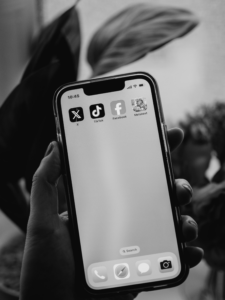 If you’ve ever been in a car accident, you know how stressful and overwhelming it can be. It can be hard to think clearly between the shock and the pain and figuring out what to do next after a car accident. One thing you might feel like doing right away is hopping onto social media to tell everyone you’re okay. You might want to reassure your family and friends that you’re alright, but doing this can hurt your case if you file an injury claim later. Here’s why you should avoid posting about your injury on social media.
If you’ve ever been in a car accident, you know how stressful and overwhelming it can be. It can be hard to think clearly between the shock and the pain and figuring out what to do next after a car accident. One thing you might feel like doing right away is hopping onto social media to tell everyone you’re okay. You might want to reassure your family and friends that you’re alright, but doing this can hurt your case if you file an injury claim later. Here’s why you should avoid posting about your injury on social media.
The Problem with Posting “I’m Fine”
After an accident, you may feel okay and want to tell your friends and family that you’re alright. It might seem like a simple way to let everyone know you’re safe. However, if you post something like “I’m fine” on Facebook, Instagram, or any other platform, the other party involved in the accident, especially their insurance company, could use it against you.
Imagine this: The person who caused the accident has an insurance company looking for any reason to avoid paying you. If they see that you posted that you’re okay, they might argue that you weren’t hurt. Even if you later experience pain, like whiplash or a concussion, they could use your earlier post to say that you weren’t seriously injured. They might claim that your injuries couldn’t have been that bad since you said you were okay.
This can cause significant problems, especially if your injuries appear after your social media post. For example, if you start feeling neck pain or dizziness weeks after the accident, the insurance company might point to that “I’m fine” post as proof that your injuries aren’t related to the accident. This is why you should avoid posting anything about your condition until you fully recover and settle your case.
For example, let’s say you’re in a car accident and later post a video of you at an amusement park, riding a roller coaster, or going for a run. Even if you’re feeling better, the insurance company could use that video to claim you’re not hurt or doing things that someone injured couldn’t do.
This can weaken your case and make it harder for you to get the compensation you deserve. Insurance adjusters are looking for any reason to reduce the money they pay. The less evidence you give them to work with, the better your chances are of receiving fair compensation.
What Should You Do Instead?
So, what should you do if you’re feeling the urge to post about your accident or your recovery? First, resist the urge to update your friends and family about your condition on social media. Even if you want to let people know you’re okay, sending personal messages to those concerned about you is better. You can reassure them directly without putting your case at risk.
Second, focus on your recovery. Ensure you see your doctor, follow their advice, and keep track of your treatment. If you need to talk about your injuries, do it with your lawyer, not on social media. Your lawyer can help guide you through the process and give you the best advice on protecting your case.
Remember that the other side can check your social media activity after a car accident. Insurance companies can look at your posts, pictures, and videos to find ways to discredit your claim. Keeping your profile private or avoiding posts related to your injury is a smart strategy to protect yourself.
After a car accident in WV, VA, or MD, you should avoid social media posts about it to protect your compensation claim. Sharing online could give insurers reasons to deny it. You should focus on your recovery, not your feed.
Hear Andrew talk about this topic in our FAQ’s!

